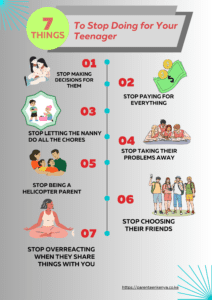As teenagers in Kenya grow up and seek more independence, parents often struggle with how much to do for them.
It’s understandable to want to protect and provide for your growing children.
However, doing too much for teenagers can inhibit their development into capable, responsible adults.
For example, giving your teenager pocket money into their late teenage years without requiring them to do any chores or take other initiatives outside the home.
This parenting method can breed financial dependence and entitlement, causing them to struggle when they move out and face the realities of supporting themselves.
Today, we will discuss seven things you must stop doing for your teenager if you want them to thrive in adulthood. Let’s get right into it.
1 – Stop Making Decisions For Them
Even with the best intentions, Kenyan parents often continue making major life decisions for their teenagers. By early teenagehood, you should be facilitating independence instead.
For example, it’s common for parents to choose which A-level subjects their teens should take or what careers to pursue without substantive input from their teens.
While you rightly want to direct your child towards success, depriving them of the opportunity to make their own informed choices prevents your teen from learning critical decision-making skills.
By middle adolescence, you should shift to a coaching role—researching careers and weighing options together but letting your teen decide for themselves.
Naturally, they’ll make some mistakes along the way. However, it is better for your teen to experience the consequences of their choices now instead of later in adulthood where they might pay a higher price.
Allowing your adolescent to experience natural consequences teaches far more than all the lecturing you’ll do. Of course, offer counsel if the choice they want to make will cause them harm.
But for day-to-day decisions about academics, careers, and social life, step back and let your teen carry the highest burden in making the decision.
2 – Stop Paying For Everything

As a parent, you likely pay for nearly everything your teen needs and wants without much thought. For instance, you pay for their:
- Clothes
- Gadgets
- Entertainment
- Toiletries
- School supplies
- Fun money with friends
While it is important to provide these things, sometimes your well-intentioned financial pampering can greatly inhibit a teen’s transition into independent adulthood.
Understanding budgets, costs, earning money and financial responsibility does not magically manifest when your teenager turns 18.
Yet many teens enter early adulthood lacking awareness about real-world finances since their parents always shielded them.
As difficult as it feels in the moment, you must phase out financial dependence in thoughtful ways. Here are ways to do that:
- Have your teen contribute their money (earned through household chores or given as a gift) toward some of their personal purchases.
- Share your household expenses and budget to teach financial literacy. Ask them how they can contribute or minimize costs.
- Give them a “lump-sum” amount and let them manage the money for clothes, toiletries, and other expenses. Do not add more before the period you set expires.
Your teen may resent the changes initially, but the life skills gained by earning and budgeting for their own lifestyle are essential for their future.
Related: Why is My Teen Always Angry? Modern Strategies for Parents
3 – Stop Letting the Nanny Do All the Chores
Imagine a situation where a home has a thirteen and sixteen-year-old. They sit all day with their gadgets or friends while the nanny cleans after them.
These teenagers do not make their bed, clean their room, clear the table after eating, or required to do any chore. Now, picture these teenagers ten years from now.
Will they manage to take care of themselves? Will they have a healthy relationship with their roommates? Can they afford to pay a nanny for themselves?
Even if they eventually learn to manage their chores, imagine the time it will take to learn these skills and the mental stress it will cause them.
Allowing a nanny to do all the chores deprives teenagers of opportunities to contribute and learn essential adulthood skills.
Adolescents need to participate in family responsibilities for healthy holistic development.
If you have full-time domestic help, give directions for age-appropriate chores to be assigned to your teen rather than done for them.
Not only does participating in family chores teach practical skills for independent living later on, but research shows it decreases anxiety and increases cognitive functioning and self-confidence in adolescents.
4 – Stop Taking Their Problems Away

Wendo fought with her close friend in school. After explaining to her mother in tears what hurtful things her friend said, Wendo was surprised when her mom immediately called the other girl’s mother to scold her and demand an apology.
Later at school, her friend avoided Wendo, whispering she reported to her parents like a baby. Wendo felt embarrassed and confused as to why her mom intervened so directly rather than letting her work it out with her friend.
This experience reflects a common tendency of well-meaning Kenyan parents to intervene by taking over resolving their teenager’s problems and other life challenges.
The following table highlights what problems parents would like to help their teens with and why they need to let them handle it.
| Teen Problem | What To Do As a Parent |
| Arguments or fallouts with friends | Let them communicate to understand all perspectives, express feelings, apologize if needed, and try to rebuild trust. |
| Being left out of social events or groups | Allow them to address hurt feelings and find new connections and interests |
| Low grades in school | Let them improve habits, face consequences, ask teachers directly about extra credit instead of you intervening |
| Forgetting important deadlines or responsibilities | Allow them to take ownership to monitor schedules, catch up or face natural outcomes for lateness |
| Conflicts with peers over sports teams, clubs, or competitions | Let them navigate rivalries, coachability, positions earned fairly through demonstrated commitment |
| Breakups with romantic partners | let them process heartbreak, grief, forgive, rediscover self-identity |
5 – Stop Being A Helicopter Parent
How would you feel if someone was always watching your every move?
Constantly directing what you should do and intervening anytime you start heading in a direction they didn’t approve of? Frustrated? Babied?
This is precisely how teenagers feel when parents remain overbearing helicopter parents long past when they should be fostering autonomy and independence. A helicopter parent is one who:
- Closely monitors all their teenager’s activities and decisions.
- Involved in every aspect of their teen’s life, from school assignments to social interactions.
- Set unrealistically high expectations for their teenager.
- Shield their adolescent from failure or disappointment.
- Maintain frequent communication with teachers, coaches, and other authority figures in their teen’s life.
- Driven by anxiety and a desire to protect the adolescent from potential harm or negative experiences.
It’s understandable to want to protect your adolescent from adversity. However, being over-involved and always hovering to shield your teen from challenges can backfire by breeding dependence, undermining confidence, and inhibiting essential coping skills for adulthood.

6 – Stop Choosing Their Friends
I know! I know! Probably this is one of the areas you fight about the most with your teen—their precious friends whom they may now prefer to hang out with, not you.
So, you worry about who they spend most of their time with, and you desire to control the friends they have.
Even though ensuring safe company is reasonable, fully dictating your teen’s friendships into adolescence can backfire.
Being overcontrolling of social connections prevents teens from learning relationship discernment, inhibits open communication about issues, and can increase their attraction towards the very friends you are against.
Rather than banning certain friends entirely, have candid talks about your guidance and concerns.
Ask thoughtful questions to learn your teen’s thought process about befriending such peers, then share perspectives on both positive and negative consequences to empower good decisions.
Establish fair household rules around inappropriate activities, but allow some independence in socializing so that they learn to choose friends for themselves.
Be the understanding parent who will listen without judgment when problems inevitably emerge with the friends you may have warned them about.
This heartfelt approach will make your teen feel comfortable coming to you with even other life challenges.
7 – Stop Overreacting When They Share Things With You
Frank felt a surge of anger when his 16-year-old daughter confessed she tried smoking with friends. Before she could explain further, he grounded her for a month—no going outside whatsoever because all her friends were clearly bad influences. His daughter was reduced to tears, saying he never lets her explain anything. She vowed not to tell her father anything anymore if this is how he reacts.
Frank’s dramatic overreaction, while born from concern, could seriously damage trust and communication with his daughter.
Many well-intentioned Kenyan parents respond poorly when teens open up about mistakes, accidents, or sensitive experiences.
Rather than getting upset, follow these steps when your teen shares upsetting or overwhelming information:
- Stay calm initially and try not to overreact.
- Ask thoughtful, probing questions to fully understand contexts and motivations before judging.
- Validate it was brave to share hard truths.
- Have an open dialogue about your guidance, grounded in your values and wisdom.
- Outline reasonable consequences aligned with family rules and expectations.
- Clarify that while certain behaviors have impacts, you love them unconditionally.
- Check if they have any concerns or questions before wrapping up.
If you respond like Frank every time your teen tests boundaries and admits it, they will stop feeling safe coming to you when issues emerge in the future.
ParenTeen Kenya offers parenting classes to help you navigate the teen years and still maintain a meaningful relationship with your teenager. Contact us today and book us for your school, company, or church parenting meetings.
Images by Unsplash and Pexel
Jane Kariuki is a devout Christian, Clinician, Psychologist, and founder of ParenTeen Kenya. She authored an exceptional training manual used in her teens’ workshop and an instructional guidebook for her parenting classes. If she is not training, blogging, or counseling, Jane loves to spend time with her sweet husband and three children.








[…] Related: 7 Things Kenyan Parents Should Stop Doing for Their Teenagers […]